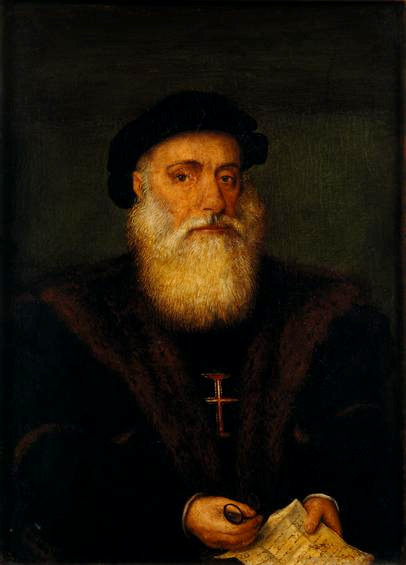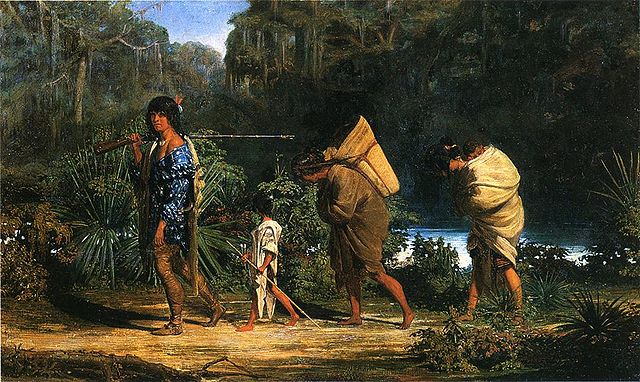This article highlights key historical events that occurred on February 12th, capturing moments of exploration, political change, scientific breakthroughs, and social advancements.
It spans from Vasco da Gama’s 1502 voyage to the 2004 same-sex marriage licenses in San Francisco, reflecting the rich tapestry of human history and progress across centuries.
February 12th Events in History
1502 – Vasco da Gama sets sail from Lisbon, Portugal, on his second voyage to India
Portuguese explorer, embarked on his second voyage to India on February 12, 1502, from Lisbon. His first voyage, which took place in 1497-1499, had successfully opened up a sea route from Europe to India around the Cape of Good Hope at the southern tip of Africa.
This second expedition was larger, comprising 20 ships, and aimed to consolidate Portuguese interests in the Indian Ocean and establish Portuguese dominance in the spice trade.
Also Read: February 11 – On this Day in History
Da Gama’s fleet engaged in several battles against Muslim traders in the Indian Ocean, which were part of the broader Portuguese effort to monopolize the spice trade.

1554 – Lady Jane Grey is executed for treason in England at the age of 16
Lady Jane Grey, known as the “Nine Days’ Queen,” was executed for treason on February 12, 1554, at the age of 16.
She had been proclaimed queen of England in July 1553, following the death of Edward VI, due to a will naming her as the successor in an attempt to prevent the throne from passing to Mary I (Mary Tudor), who was a Catholic.
Also Read: February 13th Events in History
Jane’s reign was short-lived, as Mary I quickly gathered support and deposed her. Jane’s execution was part of Mary I’s efforts to consolidate her rule and re-establish Catholicism in England.
1733 – James Oglethorpe founds Savannah, Georgia, the first settlement in the Georgia Colony
James Oglethorpe, a British general, and philanthropist, founded the city of Savannah, Georgia, on February 12, 1733. Savannah became the first settlement of the Georgia Colony, which was the last of the original Thirteen Colonies established by Britain in North America.
Oglethorpe’s vision for Georgia was to provide a fresh start for the poor and indebted of Britain and to establish a buffer zone to protect the Carolinas from Spanish Florida’s incursions.
Savannah’s unique grid layout, designed by Oglethorpe, remains largely intact and is one of the oldest planned cities in the United States.
1809 – Abraham Lincoln, the 16th President of the United States, is born in Hardin County, Kentucky
Abraham Lincoln, who would become the 16th President of the United States, was born on February 12, 1809, in a one-room log cabin on the Sinking Spring Farm in Hardin County, Kentucky (now part of LaRue County).
Lincoln is widely regarded as one of the greatest presidents in American history, primarily for his leadership during the Civil War and his emancipation of slaves through the Emancipation
Proclamation and the promotion of the passage of the Thirteenth Amendment to the Constitution, which abolished slavery in the United States.

1809 – Charles Darwin, English naturalist, geologist, and originator of the theory of natural selection, is born in Shrewsbury, Shropshire, England
Charles Darwin, a naturalist, geologist, and the father of evolutionary theory, was born on the same day as Abraham Lincoln, February 12, 1809, in Shrewsbury, Shropshire, England. Darwin’s most significant contribution to science is his theory of natural selection, outlined in his 1859 book “On the Origin of Species.”
This theory posits that species evolve over time through a process of hereditary variation and natural selection, where those individuals with traits best suited to their environment are more likely to survive and reproduce. Darwin’s work laid the foundation for modern evolutionary biology.
1818 – Chile officially proclaims its independence from Spain
On February 12, 1818, Chile formally declared its independence from Spain, marking the culmination of a prolonged struggle that began with the Chilean War of Independence in 1810.
The movement towards independence was fueled by widespread dissatisfaction with Spanish rule, inspired by the American and French Revolutions. Leaders such as Bernardo O’Higgins and José de San Martín played crucial roles in the independence movement.
The proclamation of independence was made in the city of Talca. The struggle for independence continued until 1826, when the last Spanish troops were expelled from the territory of Chile.
1825 – The Creek cede the last of their lands in Georgia to the United States government by the Treaty of Indian Springs, and migrate west
On February 12, 1825, the Treaty of Indian Springs was signed, whereby the Creek Nation ceded the last of their lands in Georgia to the United States government. This treaty was a pivotal moment in the policy of Indian removal that was being pursued by the U.S. government.
The treaty was controversial and led to significant turmoil within the Creek Nation, as it was signed by William McIntosh, a Creek chief who did not have the authority to cede communal lands according to Creek law.
McIntosh’s action led to his execution by other members of the Creek Nation. The Treaty of Indian Springs contributed to the forced removal of the Creeks and other Native American peoples to lands west of the Mississippi River.

1879 – At the Battle of Isandlwana, Zulu forces defeat British troops, a key event in the Anglo-Zulu War
The Battle of Isandlwana on January 22, 1879, was a significant conflict between the British Empire and the Zulu Kingdom during the Anglo-Zulu War. The British forces, underestimating the fighting capabilities of the Zulu warriors, suffered a devastating defeat.
It was one of the few occasions where a technologically inferior indigenous force defeated a well-equipped European army. The battle took place near the Isandlwana hill in Zululand (present-day South Africa).
The victory by the Zulus represented a significant blow to British prestige but also led to a fierce response and the eventual British conquest of the Zulu Kingdom.
1909 – The National Association for the Advancement of Colored People (NAACP) is founded in the United States
The National Association for the Advancement of Colored People (NAACP) was founded on February 12, 1909, on the centennial anniversary of Abraham Lincoln’s birth.
The organization was formed in response to the ongoing racial violence and discrimination faced by African Americans, particularly the 1908 Springfield race riot.
The NAACP aimed to secure for all people the rights guaranteed in the 13th, 14th, and 15th Amendments to the United States Constitution, which promised an end to slavery, equal law protection, and universal adult male suffrage, respectively.
The NAACP would go on to become one of the most influential civil rights organizations in the United States, playing a pivotal role in the struggle against racial segregation and discrimination through litigation, advocacy, and public education.
1912 – The last Emperor of China, Puyi, abdicates the throne at the age of six, marking the end of the Qing Dynasty and the beginning of the Republic of China
On February 12, 1912, Puyi, the last Emperor of China, abdicated the throne, marking the end of over two thousand years of imperial rule in China and the beginning of the Republic of China. Puyi was only six years old when he abdicated, following the Xinhai Revolution which overthrew the Qing Dynasty.
The revolution was led by Dr. Sun Yat-sen and his Nationalist Party, who sought to modernize China and establish a republic based on democratic principles. Puyi’s abdication was negotiated by his regents and the revolutionary leaders, leading to the establishment of a provisional government.
Puyi later lived in the Japanese puppet state of Manchukuo as its nominal emperor during World War II and was eventually captured by Soviet forces, leading to his repatriation to China where he was re-educated and lived out his days as a common citizen.
1924 – George Gershwin’s “Rhapsody in Blue” premieres in New York City
On February 12, 1924, George Gershwin’s “Rhapsody in Blue” premiered in New York City as part of an experimental concert titled “An Experiment in Modern Music” by Paul Whiteman and his band.
Gershwin composed the piece to bridge the gap between classical music and jazz, contributing to the emergence of the American music style. The composition combines elements of classical music with jazz-influenced effects, creating a unique and innovative piece that became one of the most popular American concert works.
Its premiere featured Gershwin himself playing the piano solo, and it was an instant success, catapulting Gershwin to fame and becoming a cornerstone of American music.
1934 – The Austrian Civil War begins with battles in Linz
The Austrian Civil War began on February 12, 1934, with battles in Linz and quickly spread to other parts of the country. The conflict was primarily between the Austrian government, led by the conservative Christian Social Party, and the Socialist Workers’ Party, which commanded a paramilitary force known as the Schutzbund.
The violence erupted due to mounting social and political tensions within the First Austrian Republic, rooted in the global economic depression and the rise of fascism in Europe.
The civil war lasted until February 15, 1934, resulting in a victory for the government forces and the subsequent establishment of an authoritarian regime that paved the way for the annexation of Austria by Nazi Germany in 1938.
1946 – Operation Deadlight ends with the scuttling of 121 German U-boats in the Atlantic Ocean after WWII
Operation Deadlight was the code name for the Allied operation to scuttle captured German U-boats after World War II. The operation began in late 1945 and concluded on February 12, 1946. A total of 121 U-boats were sunk in deep waters north of the Atlantic Ocean, off the coast of Northern Ireland.
This operation was part of the Allies’ efforts to dispose of the German submarine fleet, which had been a significant threat during the Battle of the Atlantic.
The decision to scuttle these vessels was made to prevent their technology from falling into the hands of other nations and to symbolize the end of the U-boat threat.
1961 – The Soviet Union launches Venera 1 towards Venus, the first spacecraft to fly past Venus
The Soviet Union launched Venera 1 towards Venus on February 12, 1961, marking humanity’s first attempt to fly a spacecraft past another planet. Part of the Venera program, the mission aimed to collect data about Venus’s atmosphere and surface.
Although Venera 1 eventually lost contact with Earth and failed to transmit data from Venus, the mission represented a significant step in space exploration, demonstrating the Soviet Union’s ambitions and capabilities in interplanetary space missions.
The Venera program would later achieve significant milestones, including the first human-made device to enter the atmosphere of another planet and the first to make a soft landing on Venus.
1973 – Ohio becomes the first U.S. state to post distance in metric on signs (although this effort was later reversed)
On February 12, 1973, Ohio became the first U.S. state to post distance signs in kilometers in addition to miles, marking an early attempt at metrication in the United States.
This move was part of a broader push during the 1970s to adopt the metric system for all measures in the country, aiming to standardize measurements with the rest of the world. However, the effort faced significant public and political resistance, leading to a slow and partial adoption of the metric system in the U.S.
The initiative in Ohio was eventually reversed, reflecting the broader challenges of metrication in the United States, where the imperial system remains predominantly in use for most purposes to this day.
1994 – The 1994 Winter Olympics open in Lillehammer, Norway
The 1994 Winter Olympics were officially opened on February 12, 1994, in Lillehammer, Norway. This event marked the first Winter Olympics to be held in a different year from the Summer Olympics, following a decision by the International Olympic Committee to place the Summer and Winter Games on separate four-year cycles in alternating even-numbered years.
The Lillehammer Games were notable for their scenic setting and the efficient organization that showcased Norwegian culture and winter sports tradition. Highlights included figure skater Tonya Harding’s controversial participation and Norwegian speed skater Johann Olav Koss winning three gold medals.
The Games were also remembered for the intense security measures following recent global events, yet they were celebrated for their peaceful atmosphere and the friendly spirit of the host country.
1999 – President Bill Clinton is acquitted by the United States Senate in his impeachment trial
On February 12, 1999, President Bill Clinton was acquitted by the United States Senate in his impeachment trial. The charges against Clinton included perjury and obstruction of justice, stemming from his testimony about his relationship with Monica Lewinsky and related legal cases.
The impeachment process was initiated in the House of Representatives in 1998, making Clinton the second U.S. president to be impeached. However, the Senate trial resulted in acquittal on both charges due to not reaching the necessary two-thirds majority required for conviction.
Clinton’s presidency continued until the end of his second term in January 2001, with his public approval ratings remaining relatively high despite the scandal.
2001 – NEAR Shoemaker spacecraft lands on asteroid 433 Eros, the first time a spacecraft landed on an asteroid
On February 12, 2001, the NEAR Shoemaker spacecraft made a historic landing on asteroid 433 Eros, marking the first time a spacecraft landed on an asteroid.
The Near Earth Asteroid Rendezvous (NEAR) Shoemaker mission, launched by NASA in 1996, was designed to study the near-Earth asteroid Eros from close orbit over the course of a year.
The successful soft landing provided valuable data on the asteroid’s composition, structure, and geology, contributing significantly to our understanding of the characteristics of asteroids and the early solar system. The mission was named in honor of Eugene Shoemaker, a pioneering planetary scientist.
2002 – The trial of Slobodan Milošević, the former President of Serbia and Yugoslavia, begins at the International Criminal Tribunal for the former Yugoslavia in The Hague, Netherlands
The trial of Slobodan Milošević, the former President of Serbia and Yugoslavia, began on February 12, 2002, at the International Criminal Tribunal for the former Yugoslavia (ICTY) in The Hague, Netherlands.
Milošević was charged with crimes against humanity, genocide, and war crimes committed during the Yugoslav Wars of the 1990s, including the Bosnian War, Croatian War of Independence, and the Kosovo War.
His trial was a landmark case for international law and the prosecution of war crimes, marking the first time a former head of state was tried for such charges.
The trial highlighted the atrocities committed during the conflicts and the importance of holding leaders accountable for their actions. Milošević’s trial, however, remained unfinished as he died in his cell in 2006 before a verdict was reached.
2004 – The city of San Francisco begins issuing marriage licenses to same-sex couples in violation of California law
On February 12, 2004, the city of San Francisco, under the direction of then-Mayor Gavin Newsom, began issuing marriage licenses to same-sex couples, challenging California state law which at the time did not permit same-sex marriage.
This bold move ignited a series of legal battles and public debates over the rights of same-sex couples to marry. The actions of San Francisco contributed to the increasing momentum for marriage equality across the United States.
Although the marriages performed during this period were later annulled by the California Supreme Court, the event was a pivotal moment in the fight for LGBTQ+ rights and set the stage for future legal victories, culminating in the U.S. Supreme Court’s 2015 decision in Obergefell v. Hodges, which legalized same-sex marriage nationwide.
